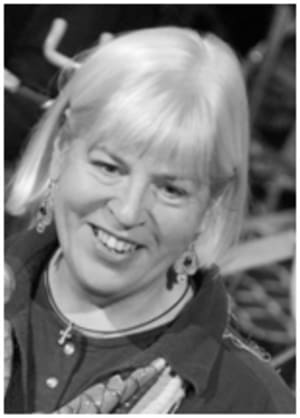 Deborah Bowen lives in Hamilton, ON, and teaches English at Redeemer University College. She has become increasingly aware of the call to live within the ancient and continuing Story, and of the impoverishment of those for whom the present is the only significant reference point. She sees postmodernity as a time of hope and new possibilities for the Kingdom Story.
Deborah Bowen lives in Hamilton, ON, and teaches English at Redeemer University College. She has become increasingly aware of the call to live within the ancient and continuing Story, and of the impoverishment of those for whom the present is the only significant reference point. She sees postmodernity as a time of hope and new possibilities for the Kingdom Story.
In your work, what are you creating, and what are you cultivating? (In Andy Crouch’s vernacular, what new culture are you making, and what good culture are you conserving and nurturing?)
Deborah Bowen: Well, my work is more than one thing, so my answer has to be more than one thing too. But I guess what I want to cultivate in all of my work is a sense of the omnipresent reality and activity of God, who is present whether or not named, whether or not recognized, upholding the universe by the word of His power, and writing the grand Story of time and eternity. As a researcher and writer, I am driven by two things: a desire to talk intelligently about texts and aesthetics and language to others who might be interested, and a love for the sheer process of discovery. Which might also be a process of creation. I have a mind that works best in making sudden intuitive leaps from established ground to new connections: Both academic writing and classroom teaching are fine venues for this kind of activity. As a teacher, I want most of all to nurture people to read wisely and well. By which I mean, to have good tools for interpreting the text of the world around them, as much as texts on the web or the books in the course. This involves helping students to pay attention—to language, to gesture, to context, to tone, to perspective. It involves helping them to see texts as having a place in textual history, in a process through time and space. It involves fighting against the atomization, reification, and commodification of absolutely everything in sight. It involves helping them to appreciate textual thickness, and its beauty.
Who is the “public” for your work—who is it for, and how does it affect the lives of those who engage with it?
Good question. I have several “publics,” depending on context. I intentionally publish with both Christian and secular journals and speak at both confessional and secular conferences. I am very conscious of “translating,” in either case: translating the quirks and peculiarities of a Christian perspective into language that might meet secular readers on common ground, and translating the perspectives of secular people into language that Christian readers might be able to recognize and appreciate. In the classroom this is also true. I see myself as a liminal person, balanced on a threshold and trying to remain fluent in more than one vernacular. How does this affect the lives of those who engage with my work? Well, I guess you’d have to ask them. I would like it to enable a kind of freedom for those in straitjackets of prejudice or fear or misapprehension. One student in my British Novels class last semester told me he was amazed to be allowed to use his imagination, as a Christian—something his tradition is deeply suspicious of. In a recent review of my last book in a secular academic journal, the reviewer, who hated the Christian stuff in the book, nevertheless said what I had to say was worth reading. These things encourage me.
Why do you do what you do?
Because I love it. And because I am called to do it. The two are obviously related. My husband would say, “Because it’s what you’ve been created to do.” I think he’s right. Once when I was particularly overstretched with work, a senior administrator at my college, meaning to be pastoral, said, “But Deborah, we’re not asking you to do as much as you’re trying to do, you know.” And I said, “No, I know. But I think God is. That’s the basis on which I came here.”

What skills, proficiencies, and virtues does this work develop in you?
Ha. Courage. Vision. Flexibility. Good listening skills. Epistemological humility. Personal organizational know-how (slow in coming—see the question above). A constant revisiting of what I already think I know, so I can know and think and imagine more. Delight in the subtleties of words. Yes, I do think that’s a virtue. An awareness of the need to aim at precision—with words, with details, with the edges of things. A trust in the daily mystery of God’s grace. And patience, with others, with books, with myself.
What five books would you recommend to someone interested in understanding or pursuing the sort of work you do?
Nice question. Let’s go for five quite different types of book.
- Jane Austen, Persuasion. A (stylistically beautiful, of course) book about learning to read appearances with great care.
- Alberto Manguel, A History of Reading. A book, as it says on the back cover, “written for bookworms. . . . A history of ourselves, and a celebration of our favourite occupation” (Margaret Visser).
- Don McKay, Vis-à-vis. An important and humble little book about the “beyond” of language that the poet sees by an act of attention “without the desire to possess.”
- Richard Mouw, He Shines in All That’s Fair. “Common grace” is a profound part of the gospel for me, and Mouw argues compellingly—and graciously—for its significance.
- David Richter, Falling Into Theory. The world of contemporary literary theory is conflicted and complex, but this book shows why it matters for reading intelligently.
What do you do for fun?
I love to play with the grandchildren these days! There are now three of them, aged five, two, and three months, and the joy of time spent with them is immeasurable. As I watch them discover things for the very first time, I feel as if I’m learning all over again what a miracle it is to be a human being.
It’s a special treat to hear live music, particularly classical music. Hearing and seeing all six Brandenburg concertos played on the same evening in the Chan Centre for the Performing Arts at UBC a few years back was one of the best things in the world. And last summer we were at three different concerts in the church of St. Martin-in-the-Fields, off Trafalgar Square in London: I felt blessed. Maybe one day I will return to playing the piano again, which I did quite seriously as a teenager. My grandfather was a semi-professional cellist; all my family are musical, and my son is making his career in music.
I miss the English countryside and the “Christendom” history of my youth, and love it when we are able to get back to Britain.
I also love to walk, and to be still, in the country around where we live in south-west Ontario, and out on the East Coast where our daughter lived for some time. To listen and pay attention.
And I’ve found the stillness of silent retreat weekends at Loyola House in Guelph very grounding and spiritually renewing.


